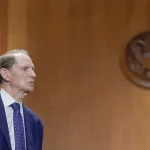

President Joe Biden’s election was heralded as the restoration of civility to the White House, if not American public life.
Media accounts of Biden’s inauguration frequently contrasted him with former President Donald Trump on this score. The Associated Press dubbed the event an “abrupt pivot to civility in post-Trump era.” The Des Moines Register’s editorial board later declared Biden’s first 100 days in office “brought good policy, compassion and civility.”
MCCARTHY ENTERS THE LION’S DEN WITH HIS GAVEL AND BIDEN’S REELECTION ON THE LINE
“We can see each other not as adversaries but as neighbors,” Biden said in his inaugural address. “We can treat each other with dignity and respect. We can join forces, stop the shouting, and lower the temperature.” It’s a theme he returned to often, telling last year’s National Prayer Breakfast, “Unity doesn’t mean we have to agree on everything, but unity is where enough of us believe in a core of basic things.”
As Biden prepares to deliver his second State of the Union address, the reality is more complicated. There have been no attacks on the U.S. Capitol since Jan. 6, 2021. The mean tweets are gone, for now. But the deep political polarization, which predated both Biden and Trump, remains.
Trust in institutions is, by some measures, at an all-time low. Only 25% say the country is headed in the right direction compared to nearly 65% who think it is on the wrong track, according to the latest RealClearPolitics polling average.
In that same polling average, not a single major national political leader is viewed favorably by a majority. Most are underwater by double digits, with the exception of two — Gov. Ron DeSantis (R-FL) and House Minority Leader Hakeem Jeffries (D-NY) — the public is still getting to know.
A survey for Georgetown University’s Institute of Politics and Public Service released around the time of Biden’s 2022 National Prayer Breakfast remarks found that 43% believe the political discourse had become less civil since he became president compared to 29% who thought things had gotten more civil and another 27% who said the situation was more or less the same. A Pew Research Center poll last year found that 81% of Americans thought the country had gotten more divided following the pandemic.
But it isn’t just the pandemic. An NPR-IBM Watson Health poll taken before the COVID-19 pandemic found that 84% thought Americans were angrier than they were a generation ago. Forty-two percent reported they were personally angrier than they were in the past.
Every presidential election since 2000, the year of the Florida recounts, hanging chads, and Bush v. Gore Supreme Court decision, has been relatively close. Barack Obama in 2008 had the best showing in that time period and he received less than 53% of the national popular vote. The defeated candidates in 2000, 2004, 2016, and 2020 to varying degrees cast doubt on their losses, with Trump pushing it the furthest with violent results. There were widely circulated conspiracy theories about the 2008 and 2012 winner’s constitutional right to run in the first place.
The last two Congresses have been bitterly divided, with small majorities. House Speaker Kevin McCarthy (R-CA) was not elected until the 15th ballot as members of his own party nearly came to blows on the floor.
Political differences now tear friendships, romantic relationships, and families asunder. It has become an annual tradition to publish articles instructing people on how to eat Thanksgiving dinner with a politically uncongenial uncle.
Years after Obama mocked the pundits who “like to slice-and-dice our country into red states and blue states,” there is some evidence from interstate migration patterns that the people are doing the slicing and dicing themselves. Democrats who were thinking of moving were nearly twice as likely to go to a blue state than a red or swing state, the Axios/Ipsos Two Americas Index found, while an outright majority of Republicans stated a preference for red states.
Nearly four-fifths of Democrats in this poll said they had little in common with Republicans. Nearly three-quarters of Republicans said the same about Democrats. Fewer than half of Democrats reported having a meal with someone from a different party in the past year.
Trump was uncharacteristically petty and prone to personal insults, while Biden is more attentive to certain bipartisan rituals as a half-century creature of Washington. The incumbent president has called McCarthy a “decent man,” if a “MAGA Republican” before becoming speaker, and Senate Minority Leader Mitch McConnell (R-KY) a “friend” who keeps his word. Trump and former House Speaker Nancy Pelosi (D-CA) were not even on speaking terms when he left office.
But Biden’s ability to restore civility was always exaggerated. He ended his first presidential campaign in 1987 after telling a voter, “I think I have a much higher IQ than you, I suspect,” and then proceeding to tell multiple lies about his academic record. Early in his most recent White House bid, he called a voter a “damn liar.” While running for reelection as vice president, Biden told a heavily black audience that the Republican ticket was going to “put y’all back in chains.”
As president, Biden called a Fox News reporter a “stupid son of a bitch” at a White House event, which his staff dutifully captured in the official transcript. He was seen as also insulting a CNN reporter’s intelligence when he demanded in response to her question, “Where the hell — what do you do all the time?” Biden apologized both times.
Biden compared Georgia’s voting laws to Jim Crow. He then refused to apologize or clarify his remarks when those laws proved compatible with record turnout and an electoral victory for Georgia’s first black senator.
The most controversial move Biden made on this front was delivering multiple pre-election speeches last year in which he cast his political opponents, “MAGA Republicans,” as threats to democracy. “The extreme MAGA element of the Republican Party — which is a minority of that party, as I said earlier, but is its driving force — is trying to succeed where they failed in 2020 to suppress the rights of voters and subvert the electoral system itself,” he said. At a political fundraiser, Biden described these Republicans as “semi-fascist.”
An Ipsos/Reuters poll taken after the first of these speeches found that 59% believed Biden’s remarks would worsen the divisions in the country.
Biden has long mixed calls for bipartisanship with sharp partisan attacks.
“Politics need not be a raging fire destroying everything in its path,” Biden said upon taking office. “Every disagreement doesn’t have to be a cause for total war.” But just as his more recent speeches obscure who is MAGA and who is a mainstream Republican, Biden’s inaugural address is vague about who is the loyal opposition and who are the “forces that divide us.”
CLICK HERE TO READ MORE FROM THE WASHINGTON EXAMINER
It is not even clear that Biden has brought about a post-Trump era, with his frequent references to “my predecessor.” Trump has already declared he is seeking the 2024 Republican presidential nomination, setting up a possible rematch with Biden.
Biden will deliver the State of the Union address on Feb. 7.







